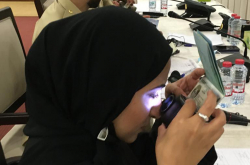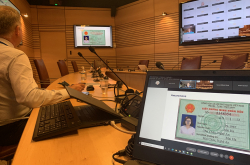INTERPOL is recognized as the International Central Office for the Suppression of Counterfeit Currency and is regarded as an important reference point for developing effective measures to combat currency counterfeiting.
We also play a similar role in the fight against travel document fraud, proposing resolutions and developing tools and services to prevent the misuse of false documents – including the creation of the Stolen and Lost Travel Documents (SLTD) database.
Bringing experts together regularly to exchange ideas and best practice is key to ensuring law enforcement stays one step ahead of criminal counterfeiters.
2019 INTERPOL Conference on Counterfeit Currency
4 – 6 September 2019 | Lyon, France
The INTERPOL Conference on Counterfeit Currency brought together 120 experts from law enforcement, monetary issuing authorities, international organizations and private industry to review the latest trends in counterfeiting and the evolution of banknote security features.
Gathering participants from 47 countries, the conference examined ways to better secure banknotes from counterfeiting and to investigate counterfeiting cases, the growing role of the Darknet and the latest developments in security features and authentication tools.

Particular issues raised included the rise of ink-jet printed counterfeit notes and resulting investigative challenges; development of national and international counterfeit currency monitoring systems; and the need for legal and operational frameworks to prevent the distribution of industrially produced counterfeit components used for banknotes.
2017 INTERPOL Conference on Fraudulent Documents
17 - 19 October 2017 | Lyon, France
We organized an International Conference on Fraudulent Documents held at our General Secretariat in Lyon, France that attracted the participation of some 140 experts from law enforcement authorities, international organizations and the private sector.
Representatives from nearly 50 member countries, five international organizations (UNODC, Frontex, ICAO, Europol and the OSCE) and 17 private companies exchanged ideas, discussed emerging trends and reviewed best practices against the threat of document counterfeiting and other related crimes.
The hands-on conference included some 20 informative presentations, six workshops and panel discussions. Expert participants were able to review the existing best practices and propose new ones to reduce the impact of fraudulent documents as facilitators of criminal activities.
Related news

Detecting fake travel documents in Southeast Asia
14 October 2019






